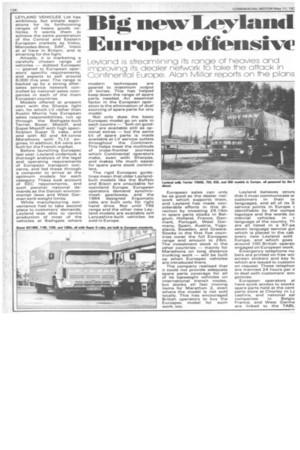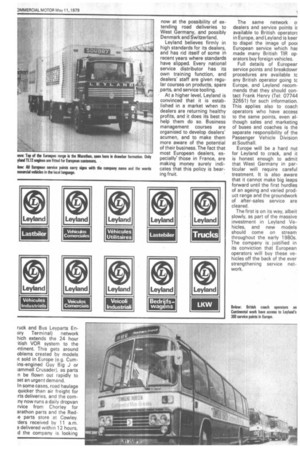Big new Leyland
Page 128

Page 129

If you've noticed an error in this article please click here to report it so we can fix it.
Europe offensivc
Leylanc is strecmlining its range of heavies and
imoroving its cecler ne-work to take -he ctfack in
Continentcl Europe, Alan Millar reoorrs on e plc ns
LEYLAND VEHICLES Ltd has ambitious, but simple aspirations for its forthcoming ranges of heavy goods vehicles. It wants them to achieve the same penetration of the Central and Eastern European markets as Volvo, Mercedes-Benz, DAF, lveco et al have in Britain, and is smarting for the fight.
Already, it is marketing a carefully chosen range of vehicles — dubbed Eurospec — geared to European operators' specific requirements, and expects to sell around 6,000 this year. The range is backed up by a strong aftersales service network controlled by national sales companies in each of the main European countries.
Models offered at present start with the Sherpa light. van, for which LV rather than Austin Morris has European sales responsibilities, run up through the Bathgate-built Terrier, Boxer, Mastiff, and Super Mastiff with high specification Super G cabs, and end with 40 and 44-tonne Marathons with TL12 engines. In addition, EA vans are built for the French market.
Before launching Eurospec last year, Leyland undertook a thorough analysis of the legal and operating requirements of European transport concerns, and fed these through a computer to arrive at the optimum models for each category. These took account of EEC requirements, and such peculiar national demands as the Danish environmental laws and West German kerb weight limits.
While manufacturing convenience had to take second place to customers' demands, Leyland was able to centre production of most of the vehicles at Bathgate where modern techniques are geared to maximum output of lorries. This has helped keep down the range of spare parts needed. An essential factor in the European operation is the elimination of dual sourcing of spare parts for any model.
Not only does the basic Eurospec model go on sale in each country — "bolt-on goodies" are available still as optional extras — but the same kit of spare parts is made available at LV service outlets throughout the Continent. This helps meet the multitude of cross-frontier journeys which Continental operators make, even with Sherpas, and makes life much easier for spare parts stock controllers.
The rigid Eurospec guidelines mean that older Leylandbuilt models like the Buffalo and Bison are unsuitable for mainland Europe. European operators demand synchromesh gearboxes, and the 1964 designed Ergomatic cabs are built only for right hand drive. Not until T45 range and the other new Leyland models are available will Lancashire-built vehicles be sold in Europe. European sales can only be as good as the dealer network which supports them, and Leyland has made considerable efforts in this direction by investing E6.16m in spare parts stocks in Belgium, Holland, France, Denmark, Portugal, West Germany, Spain, Austria, Yugoslavia, Sweden, and Greece. Stocks in the first five countries cover the full Eurospec range and amount to f 6m. The investment stock in the other countries — mainly for Marathons on long distance trunking work — will be built up when Eurospec vehicles are introduced there.
The company realised that it could not provide adequate spare parts coverage for all of its topweight vehicles on international transit routes, but stocks all fast moving items for Marathon 2, even where the model is not sold locally. This has encouraged British operators to buy the Eurospec model for such work, too.
Leyland believes stroni that it must communicate w customers in their o% languages, and all of its 3 service points in Europe E identifiable by the compa logotype and the words co mercial vehicles in t language of the country. Th are all listed in a 97-pa seven language service gui which is placed in the cab every new Leyland sold Europe, and which goes around 100 British operat( engaged on European work.
Emergency telephone nui bers are printed on free wir screen stickers and key fc which are issued to custom( on request. These telephon are manned 24 hours per d to deal with customers' erni gencies.
European operators al have quick access to stocks spare parts held at the cent parts store at Chorley in LE cashire, and national sal companies in Belgiu France, and West Germa are linked to the TABL ruck and Bus Leyparts Eniiry Terminal) network hich extends the 24 hour itish VOR system to the intinent. This gets around oblems created by models it sold in Europe (e.g. Cumins-engined Guy Big J or :ammell Crusader), as parts n be flown out rapidly to aet an urgent demand.
In some cases, road haulage quicker than air freight for Iris deliveries, and the comlny now runs a daily dropvan rvice from Chorley for arathon parts and the Redle parts store at Cowley. .ders received by 11 a.m. e delivered within 12 hours, d the company is looking now at the possibility of extending road deliveries to West Germany, and possibly Denmark and Switzerland.
Leyland believes firmly in high standards for its dealers, and has rid itself of some in recent years where standards have slipped. Every national service distributor has its own training function, and dealers' staff are given regular courses on products, spare parts, and service tooling.
At a higher level, Leyland is convinced that it is established in a market when its dealers are returning healthy profits, and it does its best to help them do so. Business management courses are organised to develop dealers' acumen, and to make them more aware of the potential of their business. The fact that most European dealers, especially' those in France, are making money surely indicates that this policy is bearing fruit. The same network o dealers and service points if. available to British operator: in Europe, and Leyland is keer to dispel the image of pool European service which ha: made many British TIR operators buy foreign vehicles.
Full details of Europear service points and breakdowr procedures are available tc any British operator going tc Europe, and Leyland recommends that they should contact Frank Henry (Tel: 07744 32651) for such information. This applies also to coach operators who have access to the same points, even although sales and marketing of buses and coaches is the separate responsibility of the Passenger Vehicle Division at Southall.
Europe will be a hard nut for Leyland to crack, and it is honest enough to admit that West Germany in particular will require careful treatment. It is also aware that it cannot make big leaps forward until the first hurdles of an ageing and varied product range and the groundwork of after-sales service are cleared.
The first is on its way, albeit slowly, as part of the massive investment in Leyland Vehicles, and new models should come on stream throughout the early 1980s. The company is justified in its conviction that European operators will buy these vehicles off the back of the ever strengthening service network.




















































































































































































































